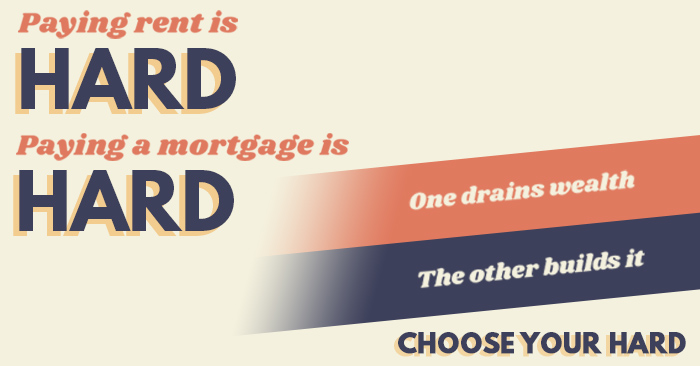A MORTGAGE IS THE BIGGEST DEBT MOST OF US WILL EVER HAVE. BECAUSE THE NUMBERS ARE SO BIG, THOUSANDS OF DOLLARS (OR POUNDS, SHEKELS, OR OTHER MONETARY SYMBOLS) CAN SLIP AWAY WITHOUT A BORROWER EVER NOTICING. HERE ARE 7 MONEY-DRAINING CRACKS THAT HOME BUYERS NEED THINK ABOUT.
1. Ignoring the true cost of home ownership
Owning a home comes with new expenses that surprise many buyers. Even experienced home owners can forget how much it costs to upgrade a home, improve outdated features, and fix hidden problems. It’s wise to take these costs into consideration before signing on the dotted line.
Before purchasing, calculate realistically what you’ll need to spend to get the home up to your standard. In some cases, you may be better off paying more for a home that’s already been upgraded than paying for a cheaper home that needs more work.
On the other hand, if you are struggling to make a down payment on a more expensive home, then buying cheaper and putting money into it over time and using your own sweat (“sweat equity”) might offset the higher down payment you would have had to make on the more expensive home.
A 20% down payment on a $300,000 is $60,000. If you can’t afford that, consider buying a nearby fixer-upper. That home might only cost $225,000, with a down payment of $45,000. The extra $15,000 might be enough for you to do many upgrades that would bring it close to the standard of the more expensive home, but you won’t need to come up with that extra $15,000 up front. This might be a good investment option—as long as you go into it with eyes wide open…along with a really good home inspection.
Ongoing Maintenance
The longer you own a home, the more you’ll want or need to make expensive fixes. A new roof may be in your future, as well as repairs to a cracked driveway or installation of a new fence. Some items can sneak up on you, like tree removal service, a broken water main, and termites!
As a rule of thumb, budget 1 to 2% of your home’s purchase price annually for maintenance. If your home will cost you $250,000, expect to spend $2,500 to $5,000 annually on unglamorous purchases like a new water heater or having your furnace serviced. The older your home and the larger it is, the more you’ll spend.
Also consider a savings fund for big ticket items. If your roof has a life expectancy of 5 years, start putting aside a little each month now.
2. Becoming house poor
There are many places in your life where you’ll need to put money besides your house. Replacing a worn-out car. Saving for retirement. Building a college fund for the kids. Life-altering vacations. Even buying furniture for your home. If you’re spending too much on a mortgage, you won’t have money for these other investments.
A general rule for housing affordability is to spend no more than 28% of your gross income on a mortgage. So, if you earn $75,000 a year, you should spend no more than $1,750 a month on payments, including insurance premiums and association fees. You can use a mortgage calculator to see how much house you can buy for the amount you can afford monthly, and how much down payment money you’ll need.
3. Not shopping around for loans
While it may seem to the average consumer that all mortgage loans are alike, and a loan broker may not even offer any options, the truth is that you do have options. You may be more or less qualified for some kinds of loans that offer better rates or terms. A military veteran’s loan is a good example of this, offering a zero down payment for some people. There are also loans for teachers and other job types, and loans for buying in certain areas.
Aside from special loans, your standard loans also come with different price tags…
According to Sergei Kulaev on the website, Consumer Financial Protection Bureau, “Our research showed that a borrower taking out a 30-year fixed rate conventional loan could get rates that vary by more than half a percent. Getting an interest rate of 4.0% instead of 4.5% translates into approximately $60 savings per month. Over the first five years, you would save about $3,500 in mortgage payments. In addition, the lower interest rate means that you’d pay off an additional $1,400 in principal in the first five years, while making lower payments.”
To compare prices, you can use one of many websites that allow you to request bids from mortgage brokers. One broker may know of a special loan that another doesn’t know about, and all may have different fees. The fees and interest rate differences between these loans can be huge, especially over the life of the loan.
You can also compare loans by calling different loan brokers personally. Be sure to include one or two bank lenders and credit unions on your list. Many of these bankers have in-house loans that might be better than another company’s loans.
4. Ignoring the APR
Some lenders advertise low interest rates but make up for the low rates with high up-front fees. If you were to spread the cost of those fees out over the life of your loan, you might discover that your effective interest rate is actually higher than you could have gotten with another mortgage. Sometimes a lower rate loan has a higher “effective” APR…making your loan more expensive over time.
APR means Average Percentage Rate and includes all the fees as though spread over the life of the loan. For instance, imagine a $100,000 30-year fixed-rate loan with an interest rate of 3.85%. Now imagine the lender charges two points (a 2% buy-down of the interest rate), a 1% origination fee, and $1,500 in other closing costs. That brings the “real” interest rate from 3.85% to 4.215% APR.
Next, imagine a $100,000 loan at 4.05%, but with no points (no buy-down), a 1% origination fee, and just $800 in other closing costs. That loan’s “real” rate is 4.199% APR.
The first loan looks cheaper on the surface, but it’s really more expensive. The difference may only amount to $10 or $11 per year, but that’s your money, year after year. If you paid your mortgage for 30 years, you would pay an additional $3,650. That’s money you could have in your hand at the end to pay off another bill, put into your retirement account, or take a vacation!
Of course, if you plan to sell in 5 years, the extra $50 might not matter to you, in exchange for working with a broker you like, or someone more willing to give you a loan based on your credit rating.
5. Making a small down-payment
Most loan programs require a 20% down payment to get the best rates and avoid paying mortgage insurance — an extra cost that typically adds $100 or more to your monthly payments! You want to avoid paying that extra premium if possible. It goes away after the home’s value rises to more than 20% of the loan value, but until that time, you could be paying an extra $100 per month for many years, with nothing to show for it.
If you can’t afford 20% down, consider three things:
- Maybe you should wait until you’ve saved up enough down payment.
- Maybe you should buy a cheaper home, where you have a 20% down payment.
- Maybe you can put 15% down…that will help.
- If you have to buy now and pay the mortgage insurance premium, but you plan to make renovations, consider getting a reassessment of value as soon as possible. Ask the lender how soon you can do that…some loans won’t reassess under two years, leaving you stuck with $2,400 in extra payments!
6. Not checking and fixing credit reports
Checking your credit report should be a part of your annual financial health checkup anyway, but when you are about to apply for a mortgage, it’s extra-important. Why? Because credit rating equals interest rate.
A low or poor credit rating will result directly in higher interest rates and higher monthly payments. The worse your credit, the higher the rate. Conversely, a lower rate might mean you can buy a more expensive (nicer) house.
But many credit reports make mistakes. Sometimes it may be a legitimate financial shortcoming on your part, but one that you “fixed” a long time ago, such as an unpaid library bill. It should have been removed from your report, but lingers. You have a right in most countries to contest that item and have it removed. Then have your credit rating rebalanced.
Doing this can mean the difference of many thousands of dollars, and even determine whether or not you get the home of your dreams.
Also, keep an eye on your credit usage. A high credit usage will cause lenders to be concerned that you are over-extending yourself. Lower credit usage demonstrates wise or controlled spending, which they like. However, don’t pay off or close your credit lines entirely. Keeping some credit also demonstrates credit-worthiness more than keeping no credit at all.
7. Not waiting until you’re more financially stable
As alluded to earlier, sometimes a buyer just needs to wait until they have more money before buying a home.
Down Payment—Coming up with a 20% down payment can be financially wise. It will result in less to pay off, and a lower monthly payment, and it will save on the mortgage insurance premium. It can be hard to wait, to delay gratification, but it can make a huge difference over the years to come.
Quality of Life—Also, making sure there is enough income to afford the maintenance, and be able to enjoy life besides, are strong reasons to plan long term for a home purchase.
Balance of Interests—However, there are legitimate reasons to buy a house, even if it stretches you financially. If it seems that house values are rising fast, or you’re able to score a great deal, or you need to purchase for another personal reason, then you may be better off jumping now, rather than waiting for the perfect financial picture.
Contact me for smart home buyer representation BEFORE YOU START HOUSE HUNTING! WE’LL HELP YOU AVOID SOME OF THE HIDDEN EXPENSES. Simply reach out to Kevin and Jennifer Hanley, REALTORS The Hanley Home Team of Keller Williams Realty Atlantic Partners Southside 904-515-2479 http://www.HanleyHomeTeam.com Team@HanleyHomeTeam.com






